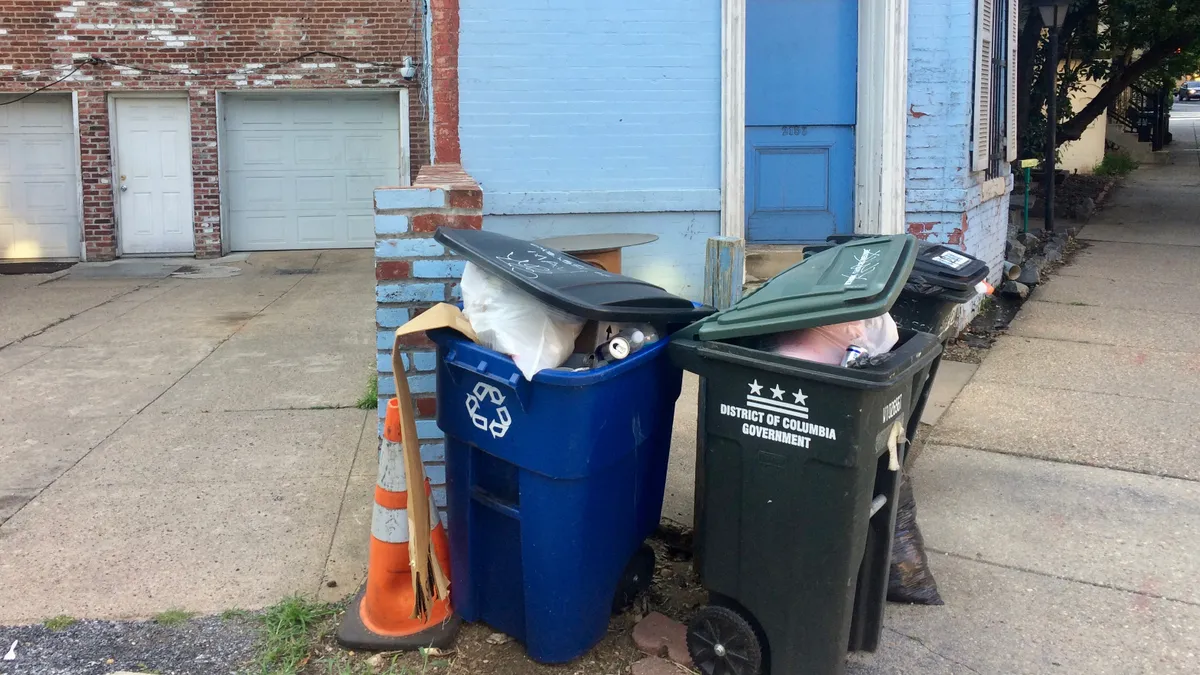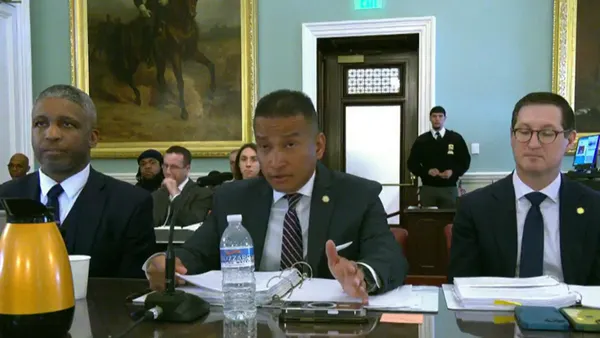Editor’s Note: Waste and recycling are inherently local issues in the United States, and we’re looking for new ways to highlight how these stories fit into broader trends. Send us your tips or feedback at waste.dive.editors@industrydive.com.
Washington, DC weighs expediting trash transfer station overhaul; Baltimore, Houston pitch recycling and organics initiatives
Budget season for the coming fiscal year has brought new choices for how cities manage their waste and recycling.
At a FY22 budget oversight hearing for the Washington, D.C. Department of Public Works on Friday, stakeholders discussed a $100 million proposal to overhaul a major trash transfer station while community waste diversion advocates expressed disappointment over lack of momentum on zero waste initiatives.
Mayor Muriel Bowser’s proposed budget for the next fiscal year outlines "$100 million to accelerate the Benning Road Transfer Station modernization to begin in FY22, including fully remediating environmental and safety issues at the site, replacing the current facility, and creating new citywide composting capabilities." Previously, such a project was not expected to take place until 2026. Structural problems at the facility rendered it partially unusable in 2020.
“It's always good to fix your broken infrastructure, but I think it's mostly about just maintaining their status quo waste management programs and processes,” said DC Environmental Network Executive Director Chris Weiss following the hearing. Weiss said his group will push for upgrades to the facility that better fit into waste diversion goals.
D.C. passed a zero waste omnibus bill into law in March, but the provisions with some cost associated were not fully funded. While D.C. officials said they would move forward with parts of the law that did not require funding to implement, following Bowser’s budgeting process full funding for that legislation remains up in the air.
“We have the zero waste goal of 80% diversion by 2032. And it strikes me that we're not well along to be able to meet that,” said Councilmember Mary Cheh. “There are significant increases in other parts of the agency but not here.”
Jeremy Brosowsky, CEO of Agricity, a company that operates a composting service in the D.C. area, urged the council to expand organics infrastructure, citing increased participation in farmer’s market food waste drop-off programs over the past year.
“We have a once in a generation opportunity to build back better, to use the recovery from the pandemic as a springboard to a healthier and more sustainable Washington,” Brosowsky said. Brosowsky described limited funding for composting in the budget as “not in line with the rhetoric of the Sustainable DC initiatives.”
In dialogue with Interim DPW Director Christine Davis, Cheh panned the agency’s slow movement on anaerobic digesters, which leaders have been discussing “for years.” Davis said the agency had near-term plans to look at facilities in Howard County, Maryland, to which the District could send food waste.
Other major cities have weighed waste and recycling ideas in their own budgets, partly bolstered by additional funds via the American Rescue Plan.
In Honolulu for instance, the approved budget includes $250,000 to improve energy efficiency at city waste facilities.
In Baltimore, Mayor Brandon Scott’s budget set up a $50 million increase for the Department of Public Works, which is under new leadership as of May. The budget includes $8.3 million, supported in part by a private grant, to distribute recycling carts to every eligible Baltimore home. There will also be a public outreach in the new fiscal year on contamination reduction. Broadly, the coming fiscal year is when Baltimore will begin to implement the “Less Waste, Better Baltimore” solid waste master plan. Scott also outlined $611,000 for Rubicon’s waste management and route optimization software.
During Houston’s budget review, council members introduced respective amendments to create a residential composting pilot program, set up automatic, opt-in text messages to remind residents of trash and recycling days, and set the groundwork for creating a mandatory recycling program for multi-family residential properties. Mayor Sylvester Turner indicated there will be additional discussions outside of the budget process about changes to be made to the city’s Solid Waste Management Department, including implementation of recommendations from a long-range plan published last fall.
More updates from around the country:
-
Cleanup efforts are underway following a major, destructive fire at a Friedman Recycling facility in Phoenix that reportedly prompted the "largest response" in the history of the Phoenix Fire Department. The company has a history of fires at locations throughout Arizona and Texas, 12 News reports.
-
Facing a 50% increase in garbage pickup costs, Flint, Michigan, is putting its waste collection contract out for bids. The city’s contract with Republic Services is currently on track to end June 30. (MLive)
-
Tallahassee, Florida’s city commission last week adopted a ban on single-use plastics for food and beverage services on city property and at city events. Elsewhere in the state, an ordinance came up in Boca Raton to prohibit city use of polystyrene foam food containers, as well as balloons and confetti.
-
Arlington, Virginia, will begin curbside collection of food scraps in September, a move that will make it the first jurisdiction in the state to provide the service to all residential customers, according to the county’s solid waste chief. The program has been a long time coming, having been part of the county’s 2004 solid waste management plan. The county has a goal to hit 90% diversion by 2038. (ARLNow)
-
Hennepin County, Minnesota, officials last week approved construction of an anaerobic digestion facility set to turn up to 25,000 tons per year of commercial and household waste including food scraps, soiled paper and compostable products into biogas. (Sun Current)
-
In a bid to reduce its recycling contamination rate to 23% by 2023, El Paso, Texas, is implementing a new challenge to residents meant to spur education and friendly competition. Over the last five years, some one in three items placed in blue bins were not accepted in the curbside recycling program. (El Paso Times)
-
Commissioners in Cameron County, Texas, this week accused Republic Services of breaching its contract to pick up brush. Some residents say it’s been months since brush has been collected; Republic said there’s been more brush than usual. The county is giving the company 30 days to catch up on collection before it renegotiates or terminates the contract. (KGBT)
-
Worker shortages and how they lead to service disruptions are repeatedly cropping up in local news reports. Rosenberg, Texas has faced inconsistent service from Texas Pride Disposal; the owner of that company is offering a $2,000 signing bonus in a bid to quickly hire more drivers. In Macon, Georgia, some residents say they have gone weeks without having waste picked up; Waste Management says that CDL drivers or diesel technicians who work for the company for at least a year are eligible for a $5,000 bonus.














